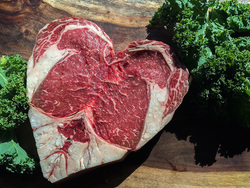
Dr. Boyd Eaton pioneered many of the concepts of the modern Paleo diet movement, although Dr. Loren Cordain is commonly recognized as the "founder." Once a fringe way of eating that eschewed the mainstream, I think it's safe to say that the Paleo diet is now fully commercialized. Dozens of books have been written on the concept, and there are hundreds of processed foods being sold as "Paleo" in stores throughout the country.
With all the hype surrounding the concept these days, it can be easy to see the Paleo Diet as just another fad. But there is much more to it than that. Eating Paleo really doesn't have anything to do with chowing down on "Paleo food bars," and it also doesn't mean you'll eat bacon all day, or give up your shoes! Instead, living a Paleo lifestyle simply involves smart exercise, sleep and eating foods that are nutrient-dense.
It may sound like a very natural way for us to eat, and indeed it is, but there are a few flaws with the concept. Probably the main objection that comes up when discussing "eating like our ancestors" is that, well, none of us were around back then - and neither was the written word - or at least, not in a form that has survived until today, so we really don't know exactly what they ate! Most likely, early humans just ate whatever they could get their hands on. However, it is a certainty that what they did eat was very, very far removed from most of what we eat today.
The human digestive tract was never designed to consume large amounts of grain, or most likely, large amounts of meat. If early humans ate seeds, which they probably did when they could find them, it would have been not much more than an handful or two every once in a while. Before we grew grains, it is unlikely that we would have found enough seeds at a time to ever make something like a loaf of bread - even if we had had the tools to grind the grain. And while animal protein was quite likely an energy source when available, it would have been consumed only in small amounts, or infrequently after a large hunt.
So what does it mean to "go Paleo" in modern terms, and what might be the benefits? For one thing, as humans probably were not designed to eat large amounts of grain, many studies have shown that we have a lot of difficulty digesting them, and this can lead to a number of health problems such as allergies, irritable bowel syndrome, and possibly even more severe diseases and disorders like colitis and Chron's Disease. Cutting grains out of our diets allows us to avoid these issues by focusing more on eating healthy proteins (grass-fed meats and wild fish), and more nutritious vegetables.
Despite what the mainstream media would have you believe, the Paleo approach involves more than just avoiding grains and dairy, and eating lots of saturated fat! It also means consuming traditional food sources such as organ meats and bone broth. After all, our ancestors, when they did eat meat, certainly ate every part of the animal they possibly could, including the bone marrow, the brains, and other organs, which are full of vaulable nutrients which are becoming sparse in the modern American diet.
And, as you may imagine, processed foods were certainly not something that our ancestors ate! Most of their foods were probably eaten raw, and even after learning to utilize fire to cook foods, cooking, drying, and fermentation would have been about as far as processing methods went.
If we want to "go Paleo," in the true meaning of the concept, we need to cut out processed foods, and eat more of a natural, whole foods diet, containing lower levels of refined carbohydrates, and higher levels of fiber and protein and healthy (aka natural) fats.
If you truly want to avoid the hype and get the healthy benefits that the Paleo diet can provide, we need to get back to the basics and eat more traditionally. This doesn't mean we are going back to the Stone Age. Obviously this wouldn't be practical, and none of us would want to anyway! What it does mean is using exercise smartly to relieve stress, removing grain and dairy from your diet for improved health for both your body and brain, and getting plenty of sleep.
Besides that, it means enjoying the community of humans around you! We have been a social animal since our creation, and this has never changed. Share your newfound knowledge with your friends and family. Explain the importance of buying and eating organic, sustainably raised foods, and why they are so much better for your health. If enough people can start eating better, not only will this benefit our health as a nation, but it can benefit the planet as well!
To your health,
Rose.
P.S. To learn more about the Paleo Diet, check out these helpful cookbooks.



 RSS Feed
RSS Feed